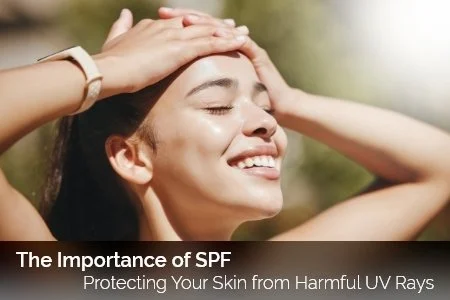The Importance of Sunscreen: Protecting Your Skin from Harmful UV Rays
Imagine soaking in the sun's bright, warm rays and experiencing the warmth of it on your skin. But amidst this idyllic scene lies a hidden danger—harmful UV rays that can wreak havoc on your skin. Enter sunscreen, the unsung hero that stands as your skin's ultimate protector.
Sunscreen becomes a vital ally in a world where the sun's rays can be both beneficial and harmful. The significance of it cannot be emphasized. Sunscreen serves as a potent barrier, protecting your skin from the damaging ultraviolet (UV) rays that the sun emits. Sunscreen prevents harmful rays from reaching your skin and harming it by forming a barrier.
You cannot disregard the harm that UV rays do to your skin. They can result in skin cancer risk, premature ageing, and sunburn. You actively contribute to maintaining the health and vibrancy of your skin by including sunscreen in your everyday routine. It becomes a proactive decision—a representation of self-care and defence.
Make sunscreen your constant friend whether you're relaxing on a beach, engaging in outdoor activities, or simply going about your everyday routines. Accept its significance and include it in your skincare routine.
Defining Sunscreen: Your Skin's Guardian Against Harmful UV Rays
It's critical to comprehend the definition and function of sunscreen. A specialist substance called sunscreen is made to protect your skin from the damaging effects of UV radiation. It serves as a screen between your skin and the sun's harmful rays, acting as a protective barrier.
But how does sunscreen work its magic? It has active components that primarily function through absorption and reflection. UV rays are absorbed by chemical filters in sunscreen, which prevents them from accessing your skin. These filters absorb dangerous radiation like little sponges. However, physical or mineral filters like zinc oxide and titanium dioxide deflect UV rays away from your skin, protecting it.
Sunscreen considerably lessens the UV radiation' damaging effects on your skin by either absorbing or reflecting them. It serves as a superhero, guarding against skin cancer, preventing sunburns, and delaying the onset of ageing. In the battle against the sun's damaging rays, sunscreen is your skin's finest ally.
The fact that not all sunscreens are made equally must be noted. Look for a sunscreen that offers broad-spectrum protection, which means it shields you from UVA and UVB radiation. Take note of the Sun Protection Factor (SPF) value as well. SPF measures how well a sunscreen blocks UVB rays, which are the ones that cause sunburns. A higher SPF offers more protection, but it's important to keep in mind that no sunscreen can completely filter UV radiation.
The Vital Importance of Sunscreen: Shielding Your Skin from the Damaging Effects of UV Rays
Premature Aging: The Wrath of UVA Rays
While soaking in the sun's rays might be energizing, too much UVA exposure can hasten the ageing process. These cunning rays damage collagen and elastin fibres by penetrating deeply into the epidermis. This can cause fine lines, wrinkles, age spots, and a decrease in the suppleness of the skin over time. Apply sunscreen liberally every day to build a layer of defence against UVA radiation damage and maintain the young appearance of your skin.
Sunburn: UVB Rays' Painful Reminder
Sunburns are frequently brought on by UVB radiation. They have a stronger impact on the outer layers of the skin than UVA rays do. In addition to the short-term irritation, agony, and redness that sunburns produce, they also raise the possibility of long-term harm, such as skin cancer. Applying sunscreen with an adequate SPF will shield you from UVB rays, decreasing your risk of sunburn and preserving the health of your skin.
Skin Cancer: A Real and Present Danger
The growth of skin cancer is one of the most important hazards connected to UV exposure. Long-term, unprotected sun exposure raises the chance of developing both melanoma and non-melanoma skin cancers. If neglected, melanoma, the most dangerous type of skin cancer, can spread to other regions of the body. Although more frequent, non-melanoma skin malignancies like basal cell carcinoma and squamous cell carcinoma can nonetheless be seriously harmful. Regular application of sunscreen and other sun protection techniques is essential for lowering your chance of developing skin cancer and preserving your general health.
Aggravation of Skin Conditions
Existing skin disorders including rosacea, eczema, and melasma can become worse when exposed to UV radiation. Hyperpigmentation, pain, and redness can all be brought on by these disorders. Sunscreen serves as a barrier, reducing flare-ups and limiting the deterioration of these illnesses. By using sunscreen in your daily regimen, you build a layer of protection that supports healthier skin and is more evenly toned.
Sun Protection Tips: Embracing Sunscreen as a Daily Skincare Essential
Apply Sunscreen Generously and Frequently
A small amount of sunscreen goes a long way. To provide complete coverage, liberally apply sunscreen to all of your skin's exposed regions. Don't forget about places that are frequently forgotten, such as the hands, neck, and ears. Use a broad-spectrum sunscreen with an SPF of 30 or higher for the best defence. Reapply every two hours.
Seek Shade During Peak Sun Hours
The sun's rays are most intense between 10 am and 2 pm. Limit your time in the sun during these peak times if you can. To lessen exposure to UV radiation, seek shade behind trees, umbrellas, or awnings. This little action can dramatically reduce the risk of sunburns and other skin damage caused by the sun.
Wear Protective Clothing
An extra line of defence against UV rays is provided by clothing. Choose lightweight, closely woven materials that provide the most skin coverage. Sunglasses with UV protection cover your eyes and the sensitive skin surrounding them, while wide-brimmed hats protect your face, neck, and ears. For extra peace of mind, think about adding sun-protective gear to your wardrobe.
Be Mindful of Reflective Surfaces
Water, sand, snow, and concrete are examples of reflecting materials that UV rays can bounce off, magnifying their effect on your skin. Apply sunscreen more regularly, wear protective clothing, and use sunglasses to protect your eyes when in such conditions.
Practice Sun-Safe Habits Year-Round
Year-round UV radiation is abundant, even on gloomy or rainy days. Sunscreen shouldn't merely be used during the summer or on sunny holidays. Regardless of the weather, make it a daily ritual to apply sunscreen as part of your morning beauty regimen. To preserve your skin and prevent long-term damage, consistency is essential.
Stay Hydrated
Maintaining healthy skin requires proper moisture. Throughout the day, be sure to stay hydrated, especially if you're out in the heat. Skin that is properly hydrated is more resistant to damage from the sun.
Why Sunscreen is Crucial for Your Face: Preserving Skin Health and Beauty
Protecting Against Harmful UV Rays
Your facial skin is fragile and more vulnerable to UV radiation's harmful effects. Unprotected sun exposure increases the risk of developing skin cancer, sunburn, and early ageing. Applying sunscreen to your face helps to build a layer that helps to block and absorb damaging UV rays, minimizing the risk of skin damage.
Prevention of Hyperpigmentation and Uneven Skin Tone
Overproduction of melanin can be sparked by UV radiation, which can result in hyperpigmentation, dark patches, and an uneven skin tone. These imperfections can take away from your inherent attractiveness and give your skin a drab, ageing appearance. The regular use of sunscreen on your face reduces the possibility of hyperpigmentation and keeps your skin's tone more even and luminous.
Preserving Skin's Youthful Appearance
Sun exposure hastens the ageing process, resulting in the development of wrinkles, fine lines, and sagging skin. You can protect your face from the damaging effects of UVA and UVB radiation and maintain the suppleness and firmness of your skin by including sunscreen in your regular skincare regimen. A younger and bright face look results from this.
Safeguarding Against Skin Cancer
Any region of your body can develop skin cancer, but the face is especially susceptible because of its continual exposure to sunlight. Face sunscreen use is an essential first line of protection against skin cancer development. You lower your chance of developing skin cancer, both melanoma and non-melanoma forms, by shielding your facial skin from UV ray damage.
Enhancing the Effectiveness of Skincare Products
The benefits of any other skincare products you might be using are complemented and improved by sunscreen. Exfoliants and retinol are only two components in skincare products that can make skin more sensitive to the sun. You can reduce the chance of negative reactions and potential harm when using these items by putting on sunscreen every day. It guarantees the continued efficacy of your skincare regimen and promotes the general wellness and vitality of your facial skin.
Conclusion
Sunscreen is not just a skincare product; it's a vital defence against harmful UV rays. By prioritizing sunscreen in your daily routine, you safeguard your skin from sunburn, reduce the risk of skin cancer, and maintain a youthful appearance. Embrace sunscreen as your trusted ally in protecting and preserving your skin's health and beauty. With sunscreen, you can confidently enjoy the sun while keeping your skin safe.


